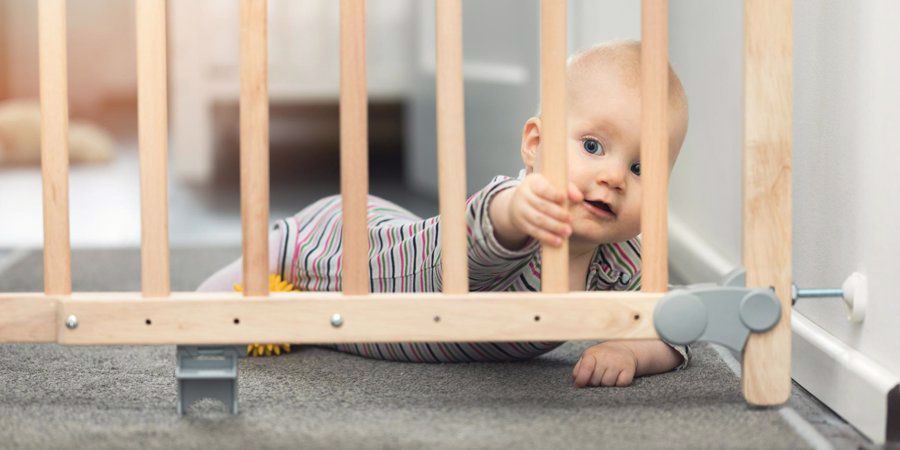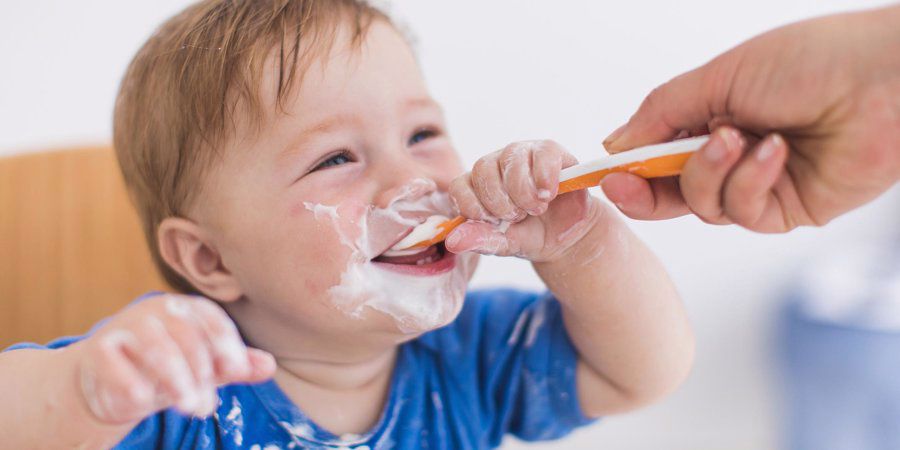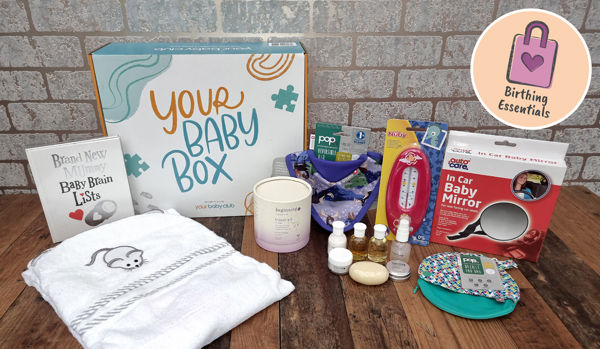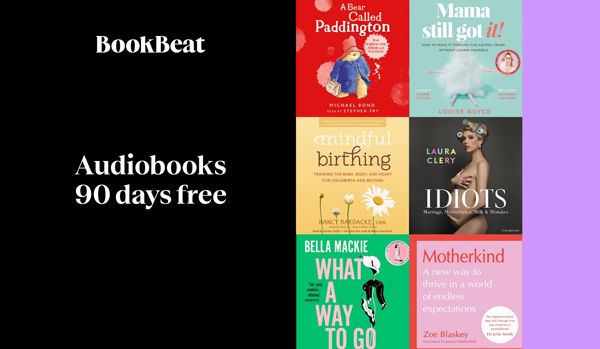When your baby reaches six months old it’s a real milestone for you and them. They’ll have taken their first tastes of solid food and be moving around a lot more. Plus they’ll be reacting and responding to you and others around them. It feels like the end of the ‘newborn’ stage and the start of them being a little boy or girl.
[Read more: Your Baby's Development - Newborn to 6 Months]
Here’s what to expect over the coming months:
At six months
There’s a lot going on at six months, and it can be overwhelming! You’re likely having lots of conversations with your friends and family about weaning, and you may have already started your baby trying out some foods. There’s no pressure on when you start, how you do it or how long it takes for your baby to be eating a range of foods. As long as you follow the recommended guidelines, take it at your own pace and respond to your baby’s needs. If they’re not interested in food yet or are having trouble chewing, don’t push it or you’ll both get stressed. Your baby will still be getting plenty of nutrition from their milk intake so solid food is an add-on at this age.
[Read more: A Complete Guide to Weaning Your Baby]
In terms of their physical development, you’ll find that your baby is fascinated by the world around them. Their focus has improved so they can notice small details now, and start reaching out for an experimental feel. They will love feeling different textures, like water, paper and the grass outside. Helping your baby to experience lots of different items to touch is great for improving their attention span and curiosity, as well as practising for weaning.
Your baby’s speech will be developing too, although they will only make short sounds by this stage. They will listen to everything you say and the sounds around them and will try to repeat things back. Even though you may feel a bit uncomfortable doing so, try to talk to your baby all the day, such as describing what you are putting in the supermarket trolley or what you can see on a walk.
At seven months
Just when you think you’ve mastered weaning and the major life change it brings, then crawling comes along and brings more disruption! Some babies start crawling from six months, with others not starting until around ten months, and some skip the crawling stage and move straight to walking. There are lots of ways you can help your baby to start crawling, but will all of them you’ll need a lot of patience. Your baby may be able to sit unsupported at this age and be able to move into a sitting position from laying down. There is likely to be a lot of rolling, so keep the floor clear.
[Read more: Getting Your Baby on Their Feet]
Your baby will also be using their hands more and will be able to clap and hold an item in both hands soon. You may notice that your baby can support their weight on their legs if they are holding on to you or a piece of furniture. It’s unlikely that they will be able to stand for a long time though, so make sure you are there to support them sitting down or toppling over. You can help strengthen your baby’s legs by helping her to bounce, either in a bouncer or with you holding them. Do not leave your baby unattended in any form of bouncer or bouncing chair.
If it hasn’t already started, your baby may start teething now. Look for signs such as excessive dribble, sore gums and your baby chewing furiously on objects and their fists. Teething starts with the bottom teeth and then the top ones follow soon after. You may be able to see a white patch in their gums as the tooth pushes its way through.
[Read more : When Should Babies Start Teething? ]

At eight months
Your baby may be well on their way to crawling now or have already begun, so you’ll probably see lots of the ‘skydive’ pose. If you can, allow your baby to figure it out for themselves and develop their own crawling style. It could be a commando crawl, bum shuffle or even on their knees. Try to challenge them by placing a toy or drink slightly out of reach so that they need to move to get it. Your baby will fall and bump into things, and you may find their arms and legs have many bruises. This is perfectly normal but you can help by installing some safety options, such as padded corners for furniture.
You’ll also find that your baby tries to pull themselves up, using furniture or your legs. This is part of their progression to walking. Make sure that your baby has a soft landing if they fall, and can not reach anything inappropriate if they start to cruise along. At first, they may not be able to work out how to sit down again, so guide them down and they will pick it up quickly.
Your baby will be more expressive at this age and be able to clap at something they like. They are also able to use their fingers to pick up smaller objects, especially food that they want to eat.
Separation anxiety can kick in at this stage, especially if you are heading back to work. It’s nothing to worry about and it really is just a phase. Whilst it can be very upsetting for you, stay strong and stick to your guns. You’d be surprised at how easily your baby can be distracted by something else and forget all about missing you. You can help your baby transition into childcare by sending them with items they are familiar with, or that remind them of home or you.
[Read more: Juggling Work Vs Baby]
At nine months
If your baby has started crawling, you’ll notice that their speed and range of movements increase month on month. They may even be walking along with the help of a walker or holding your hands. They might try out a step or two by themselves but don’t be disappointed if they don’t start walking until much later on. They are likely to sit down with a bump so try to stay close or have plenty of cushions to hand. You don’t need to buy any ‘proper’ shoes for your baby until they are walking unaided, but it doesn’t hurt for them to have some soft shoes for cruising or playing outside. Make sure the footwear has plenty of room and non-slip soles. Look for slipper sock styles with sticky dots on.
You’ll find that your baby will want to play with different toys now, and will enjoy actually playing games. Items that are very popular at this age include stacking cups, push along toys and big blocks. A simple game could involve passing objects between one container and another, or rolling a ball back and forth. Bathtime will be much more fun too, but watch out for splashes and water being poured over the side.
You may hear noises from your baby that sound like real words, with mum and dad being among the first ones. At this stage, try to encourage your baby to make sounds in general, rather than speaking actual words. If your baby has a dummy, try to reduce their time with it to just naps and bedtime to encourage them to speak more.

At ten months
Your baby’s speech will improve month on a month now, so encourage and praise them as much as possible. Make sure that you are using the correct full words so that your baby heard what they should sound like. For example, if they say a word, repeat back the full form word to them with some positive encouragement.
If you haven’t already, it’s a good idea to get some stair gates installed as your baby will be very interested in exploring upstairs. Whilst they may be able to get up very quickly, they may not be able to make it down again. Mobile stair gates are available if you need to take one to a relative or someone who looks after your baby often.
At this age, your baby will take a keen interest in other babies and children, especially those older than them. They may be able to wave at you or blow you a kiss, and have formed good attachments with other caregivers. Whilst your baby will not possess its full range of social skills yet, it's a good idea for them to socialise with other children. Try to give them a bit of freedom to express themselves, but step in if there’s any undesirable behaviour. It is very common from this age onwards for children to bite, hit or pull hair. Make sure that you are firm in expressing that you are not happy with their actions and that their other carers take the same approach too.
[Read more: Why Do My Children Bite?]
At eleven months
Following on the theme of discipline, by around eleven months your child will understand the word no, even if they don’t respond in the way you’d like. They may also be able to follow simple instructions. Your child is likely to be showing you more of their character now, and becoming more independent. They may push you away if you try to help with a task, so try to be patient and wait for them to ask for help. Keep describing everything you are doing, such as when you are helping your child get dressed. It’s a good age to start setting some boundaries, even though it may be a few months before they are really following them.
You can encourage your child to drink from a cup by themselves and start to hold a spoon or fork. They may miss their mouth but stay positive and give them lots of praise. You may even a phase of your child throwing things, so watch out for dirty bowls or drinks cups! There’s nothing malicious about the throwing, it's more of a test of where things go.
At twelve months
Wow, you’ve reached your baby’s first birthday! It can be tempting to really splash out but bear in mind that your baby won’t remember what’s going on.
Walking unsupported is just around the corner now so encourage your baby to keep practising their cruising and walking with help. It may be a few days or weeks before they transition fully away from crawling but it will come. You will see that their energy levels increase and they may be sleeping for less during the day. Encourage more active games and activities to help their legs and arms to strengthen further. You don’t need to buy expensive toys, your child will have a great time playing with pots, pans, spoons and empty containers.
Your baby will probably be fascinated with looking at books, and you can enjoy them together. Reading a bedtime story may already be part of your routine, or you can start asking questions when looking at a book. Ask your baby to point to a particular picture or make the actions or sounds of an animal for example.
At twelve months your child will be called for their next round of vaccinations. If you have not heard anything from your local surgery, get in contact with them. This round includes four different immunisations, containing Hib/MenC vaccine (which is a single jab containing vaccines against meningitis C first dose and Hib fourth dose), the first dose of MMR, the third dose of pneumococcal (PCV) and the third dose of the meningitis B vaccine. It is possible that these will be given as four separate injections but your surgery will be able to advise on this in advance.
[Read more: Why I Think You're Wrong if You Don't Immunise Your Kids]
Thirteen to fifteen months
As your child moves into their second year, you’ll really start to see the difference from them being a baby and becoming a toddler. Although your child may not be walking confidently by themselves yet, there’s plenty of time to help them establish this. Even if they are walking, you can encourage them to walk independently to build their confidence and their leg muscles. Whilst it may take a lot longer than pushing them in the buggy, try to suggest your child walks as much as possible.
Your child will be becoming much more adventurous in their play thanks to their developing fine and gross motor skills. They will be able to pick up and move a toy easily and should be able to understand that it is still the same object that has moved. They will be experimenting more during playtime, bathtime and mealtime so be ready for plenty of mess. If you can, head outside and play with water, bubbles or paint, or get creative with sensory materials like rice, cooked spaghetti or cotton wool.
Your child’s speech is expanding every week, with more words being added to their vocabulary. The words that they are confident with will sound clearer too, although some letter sounds can be tricky to master.
At around fifteen months, your child will come to the end of their teething journey; although it may be later than this if their first teeth came through late. The final teeth to emerge are the molars, which are the big teeth right at the back of the mouth. Unfortunately, due to the size and position of the molars, they do tend to cause painful teething for your child, even if they haven’t had any symptoms before.

Sixteen to eighteen months
By the time your toddler is approaching eighteen months, their personality will really be shining through, and you may start to recognise some of your own traits in them too (good and bad). Some aspects will be less developed still, such as their social skills. Sharing takes a long while for your toddler to understand and be able to show, even when they are in an environment with other children or have older siblings. You can encourage sharing at home by calmly demonstrating what kind sharing looks like. Resist the urge to enforce ‘taking turns’ on your children, as this can lead to resentful behaviour. Instead, try to encourage your child to offer an object to another, and understand that they have done a good deed.
By eighteen months your child will have mastered around twenty words with confidence and will be ‘speaking’ much more frequently. You can encourage them to expand their vocabulary with word games or singing familiar songs such as nursery rhymes. It can be useful to sing the same songs at home as your child sings at nursery or childcare.
Whilst your child may have taken to weaning well, they are likely to enter a fussy phase at around eighteen months. This coincides with them developing more understanding about the world around them, and becoming fearful of trying new or unfamiliar things. Look at your child’s eating across a week rather than a single day, especially if they are eating well outside of the home. This can often be the case in a nursery or childminding setting where many children eat together. Try not to bribe or coerce your child into eating foods they are not comfortable with. Instead, it can be helpful to offer a range of foods and let them choose, or give them options to make a choice from. In this way, you are reinforcing their independence but also getting them to eat. The fussy eating stage can continue for a good few months or even years but the majority of children do grow out of it. If you are concerned that your child is losing weight or not getting enough nutrition, speak to your health visitor or GP.
If bedtime is a struggle at this age, now is a good time to start enforcing more of a routine and your child falling asleep by themselves. This can be a challenge, for both the child and for you, especially if you are co-sleeping or staying with your child until they fall asleep. There are plenty of approaches to try, and your child should be able to understand and respond more to you explaining the situation. Like with everything at this age, remember that your child is still very young and there is plenty of time to progress the situation. There is no point causing you and your child stress if a particular approach isn’t working.
[Read more: How to Actually Get Your Baby to Sleep]
The ages for these milestones are given as a rough guide only, as every child develops at their own pace. Even siblings will reach their milestones at different ages and in different ways; there really is no second-guessing a child!
If you are worried about any aspect of your child’s development, both mentally or physically, please consult a medical professional. It can be tempting to have a quick look online to see if other parents are in the same situation as you. Chances are that they will be, but their child may be different from yours. Your friends and family will offer you lots of ‘helpful’ advice, but the only advice you need comes from a trained, knowledgeable practitioner.





